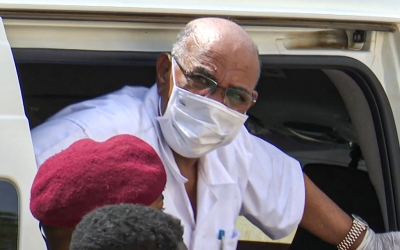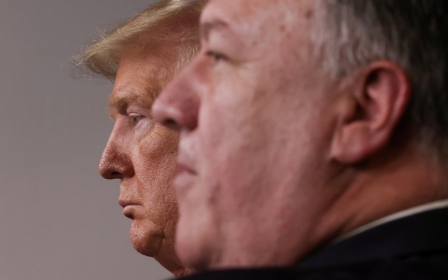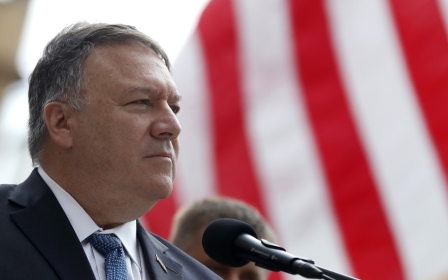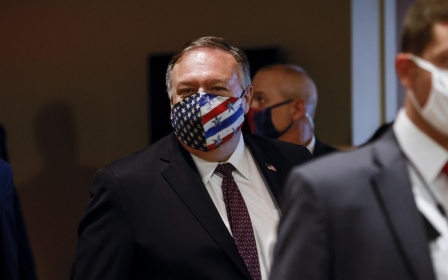Sudan's government tells Pompeo it is 'not mandated' to normalise ties with Israel
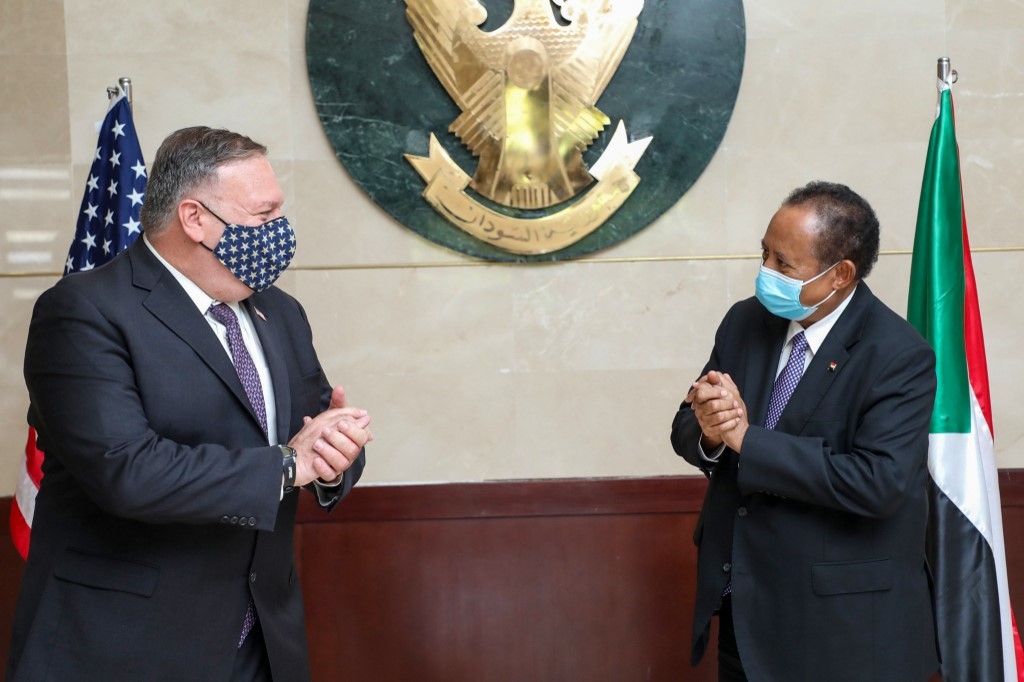
Sudan's Prime Minister Abdalla Hamdok on Tuesday told US Secretary of State Mike Pompeo that his country's transitional government was not mandated to normalise ties with Israel, a cabinet spokesman said.
Pompeo had landed in Khartoum, the second leg on his Middle East tour, on the first official direct flight from Israel and Sudan, which do not have official diplomatic relations.
The secretary of state was the first top American diplomat to visit Sudan since 2005.
"Happy to announce that we are on the FIRST official NONSTOP flight from Israel to Sudan!" Pompeo said on Twitter, ahead of the visit.
The visit was seen as part of US efforts to persuade more Arab countries to follow the United Arab Emirates in normalising ties with Tel Aviv.
New MEE newsletter: Jerusalem Dispatch
Sign up to get the latest insights and analysis on Israel-Palestine, alongside Turkey Unpacked and other MEE newsletters
At the meeting with Pompeo, Hamdok reaffirmed the importance of separating normalisation of ties from a US decision on removing Sudan's designation as a state sponsor of terrorism, cabinet spokesman Faisal Saleh said in a statement.
Analysts had argued that Khartoum was under pressure from the US, Israel and the UAE to pursue normalisation, and that the lifting of crippling US sanctions may constitute an incentive for the African nation to reverse its official stance on Israel.
The US had sanctioned Sudan over its alleged support for militant groups and the civil war in Darfur, during the rule of Omar al-Bashir Bashir, the long-time ruler ousted by the military in April 2019 after popular protests against him.
Trade sanctions had been lifted in 2017, but Sudan remains on the US's list of state sponsors of terrorism, which prevents it from accessing badly needed funding from international lenders.
Hamdok tweeted earlier on Tuesday that he had discussed with Pompeo the lifting of Sudan from the list as well as Washington's support for the transitional government.
On Sunday, Pompeo had kicked off his Middle East tour in Israel. As well as the visit to Sudan, the trip will also include stops in the UAE and Bahrain.
The tour comes in the wake of a US-sponsored normalisation deal between Israel and the UAE, announced on 13 August.

The deal has been denounced by Palestinians from across the political spectrum, who dismissed it as tantamount to "treason" and "a stab in the back".
According to a press release from the US Department of State, Pompeo was set to meet with Hamdok and Sovereign Council Chair General Abdel Fattah al-Burhan, "to discuss continued US support for the civilian-led transitional government and express support for deepening the Sudan-Israel relationship".
Pompeo will later head to Manama to meet with Bahrain's crown prince and conclude his trip in Abu Dhabi, where he is due to discuss the normalisation agreement and other regional issues.
Sudanese divisions
The UAE deal has sparked divisions in Sudan's ruling establishment.
The country has been ruled by an alliance of civilian technocrats and military officials formed in the wake of the 2019 protests that ousted Bashir.
On Monday, the Forces for Freedom and Change (FFC) political coalition, which backs the transitional government, announced in a statement that it had agreed with Hamdok to reject normalisation.
A source close to Hamdok's office told Middle East Eye last week that the entire transitional government had agreed to postpone any decision on issues related to ties with Israel until an elected government was in place after the 2022 general elections.
Divisions in the transitional government came under the spotlight when foreign ministry spokesman Haydar Sadig was sacked after he hailed the UAE-Israel deal in media statements last Tuesday.
Sadig had called the deal “a brave and bold step”, and noted that Khartoum and Tel Aviv already had secret diplomatic relations.
The foreign ministry said it was "astonished" by Sadig’s comments, and stressed that the government had not discussed the possibility of diplomatic relations.
But in a phone call with MEE last Wednesday, Sadig said he was expressing his “personal views”, and that he stood by his remarks that his country maintains contacts with Israel.
Israel’s intelligence chief Yossi Cohen also contradicted the Sudanese statements, saying that his government was in contact with Sudan and that normalisation was “part of the agenda” for their diplomatic relations.
Earlier this year, Israeli Prime Minister Benjamin Netanyahu had met with Burhan, the head of Sudan's ruling council, and reportedly discussed normalisation.
At the time, the meeting had been viewed by Sudanese analysts as an attempt by Khartoum to get in Washington's good graces and secure the lifting of crippling US sanctions.
Middle East Eye delivers independent and unrivalled coverage and analysis of the Middle East, North Africa and beyond. To learn more about republishing this content and the associated fees, please fill out this form. More about MEE can be found here.


